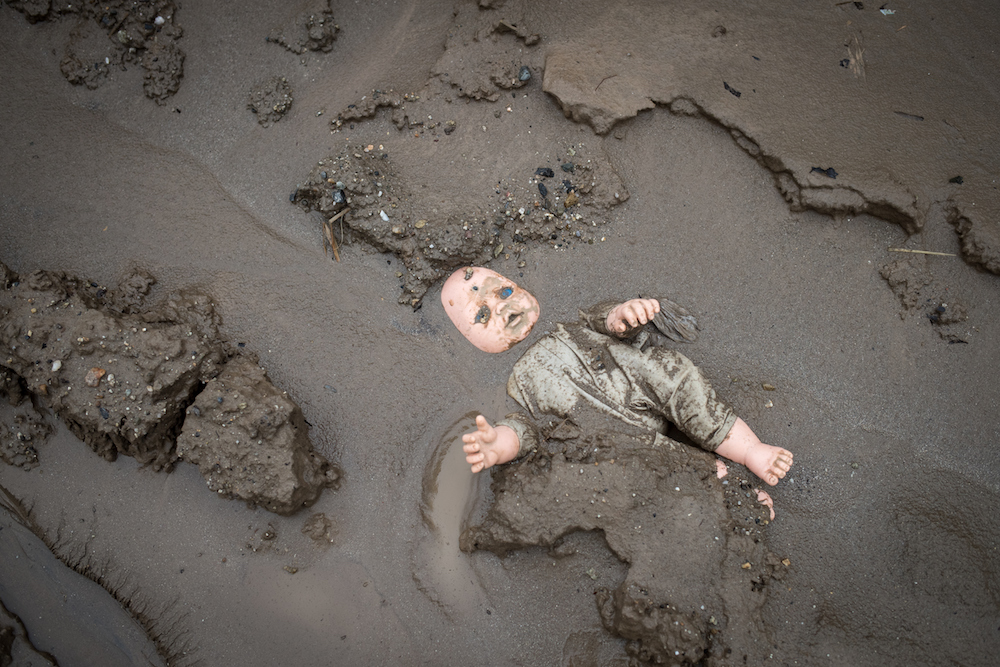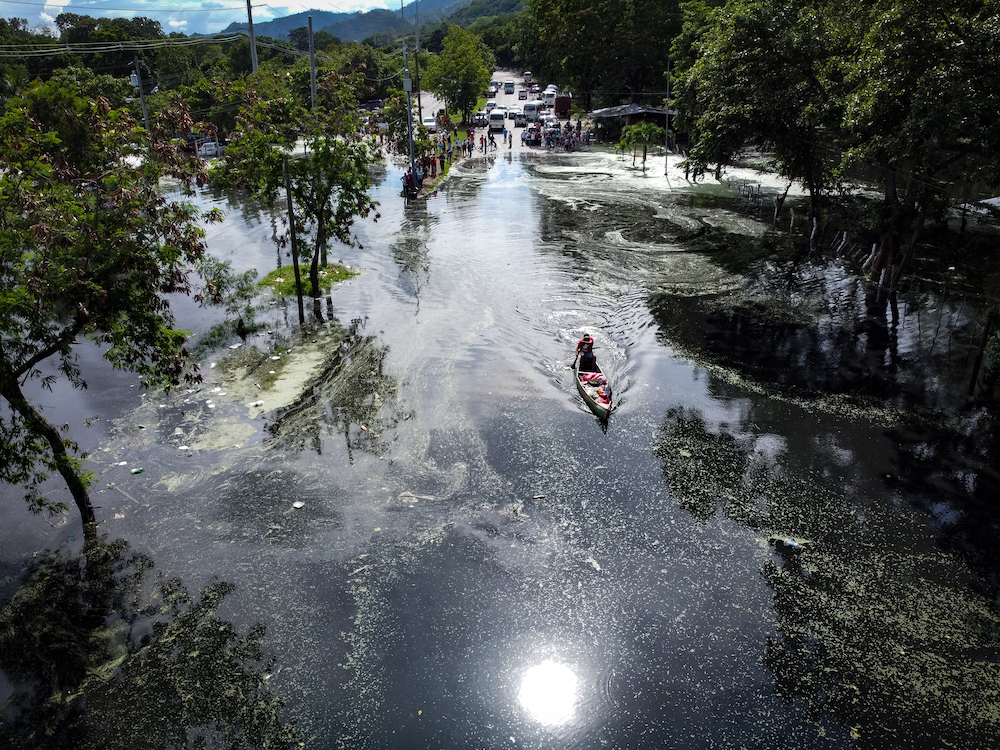
After hurricanes Eta and Iota in 2020, a child's doll is stuck in the mud in a street in Chamelecón, San Pedro Sula, Honduras. Scientists say climate change is making storms like those more frequent and more severe. (Photo courtesy of Sean Hawkey, World Council of Churches)
Editor's Note: EarthBeat Weekly is your weekly newsletter about faith and climate change. Below is the Nov. 12 edition. To receive EarthBeat Weekly in your inbox, sign up here.
If there's one thing the dual crises of COVID-19 and climate change have shown us, it's that we humans are tragically incapable of putting aside national power plays and special interests to safeguard the common good.
But at the same time, the United Nations climate conference that is coming to a close in Glasgow, Scotland, has highlighted at least one group that can pull together in a crisis. People of faith from around the world are speaking out, especially about the moral implications of the irresponsible economic choices that fuel global warming.
And faith leaders have been joining together to hold world leaders and their own congregations to account.
That should come as no surprise to readers of EarthBeat, but it has increasingly made news during this climate conference, known as COP26, as mainstream media and specialized climate publications have reported on the words and actions of Pope Francis and other faith leaders before and during the event.
It seems that both officials and the media have discovered the power of religious groups that Iyad Abumoghli, director of the U.N. Environment Programme's Faith for Earth Initiative, recognizes: Religious institutions are major landholders and have significant economic clout, and people tend to listen to their faith leaders.
Abumoghli spoke with NCR environment correspondent Brian Roewe about the tasks that lie ahead for people of faith in continuing the effort to stem global warming. The engagement of faith groups on climate change is evident in this montage of photos and quotes from Catholics who were among the approximately 100,000 demonstrators who took to the streets in Glasgow Nov. 6 to press for climate action and climate justice.
The faith-based movement for climate action knows no denominational boundaries, as leaders of most faith traditions see it as part of their mandate to care for the communities most vulnerable to climate change and preserve what they see as a divinely given environment, write Luis Andres Henao and Jessie Wardarski for the Associated Press.
One mission of faith groups at COP26 was to make sure some voices weren't lost in the crowd, especially those of Indigenous peoples from the Arctic to the equator, as Emily McFarlan Miller reports at Religion News Service. And Brian found that Indigenous leaders from various parts of the world are proposing solutions to stem global warming in ways that won't destroy their lands and livelihoods.
Francis continues to be outspoken on climate issues. In a letter to Catholics in Scotland, ahead of the end of COP26, he warned that world leaders must address climate change before it's too late, "lest we face God's judgment," writes Junno Arocho Esteves for Catholic News Service.
And in the Amazon region, which scientists fear is edging closer to a tipping point that could decimate much of the tropical ecosystem, Catholic bishops issued a video message in an effort to mobilize society and pressure the Brazilian government and others at COP26 to adopt concrete and urgent measures to protect the biome, reports Lise Alves at Catholic News Service.
Brazilian theologian Leonardo Boff adds that COP26 has not responded to the climate emergency and that it is important to look to the Amazon, not only to protect its ecosystems from destruction, but also to learn from the people who live there.
Meanwhile, in the United States, Catholic sisters are among those in places like North Dakota who are grappling with how to handle the effects of an oil boom while laying the groundwork to tap other forms of energy, Dan Stockman writes for Global Sisters Report.
As I write this, negotiators in Glasgow are still wrangling over the language in their final declaration. There are some signs that it might move the needle slightly, but not enough to meet the target of limiting global warming to no more than 1.5 degrees Celsius (2.7 degrees Fahrenheit) by the end of this century.
Scientists say there is still time to do what's needed to turn down the heat — but as Pope Francis reminds us, there is no time to lose.

A boat navigates along the main highway between San Pedro Sula and the port of Puerto Cortés in Honduras after the road was flooded by rain from hurricanes Eta and Iota. (Photo courtesy of Sean Hawkey, World Council of Churches)
Here's what we've heard from readers:
EarthBeat readers have weighed in this week on the events in Glasgow.
Sr. Betty Maschka, a member of the Sisters of St. Joseph of Concordia, Kansas, writes:
I am praying that we can all come together and really pledge to do what we need to do NOW, because we really do not have time to wait. I am also praying that if pledges are made then they need to be kept. Is there some way to hold each other accountable to their pledges?
We are really responsible for each other on our planet Earth and so we need to help each other and not forget those who are most affected. They need our attention, aid and love to get through. Please make the most of this conference! We are counting on you. We need to be open to the light of God to lead us on! With our common faith belief to lead us and our confidence in God's leading light and love we can and need to work for the defense and safety of our common home!
And Michael Wright of Glen Rock, Pennsylvania, writes:
Your piece covering COP26 and Catholic activists' advocating for more action on climate change omitted one important factor: That the U.S. Catholic church has essentially ignored climate change, and care for creation in general, even since Laudato Si'. Instead, it myopically continues to focus on abortion — admittedly another morally grave issue, although abortion rates are actually decreasing.
Meanwhile, deaths due to climate change are increasing from drought, famine, disease and flooding, most perilously for the poor and vulnerable. Yet U.S. bishops continue to ignore this very real threat to humanity's existence on Earth. This has also led to pro-creation Catholics, who advocate for protecting the environment rather than prohibiting abortion, being called "liberals" and "baby killers," unworthy to even receive holy Eucharist.
In fact, the church's silence regarding the moral imperative of climate action has contributed to election wins for politicians who oppose climate solutions like reducing fossil fuel consumption. Is it only coincidence that the [U.S. Conference of Catholic Bishops] is led by Archbishop José Gómez, whose Los Angeles Archdiocese leases land for oil drilling?
The archbishop also had a powerful voice in citing the "preeminence" of abortion in the bishops' "Faithful Citizenship" guide (America, 11/12/19). This effectively deprioritized climate change and other morally grave issues in the minds of voting Catholics.
We are now at a point where urgent and decisive action is needed to avoid the worst impacts of climate change. Is the Catholic Church finally prepared to make climate change the "preeminent" moral issue that it is?
Advertisement
Here's some of what's new in other climate news:
- COP26 has shone a spotlight on the world's forests, leading Mary Annette Pember at Indian Country Today to ask whether carbon markets will bring Indigenous peoples a needed windfall or if they are a scheme to appropriate tribal territory without addressing the root causes of climate change.
- At Bajo la Lupa, Aldo Benítez delves into the disappearance of Paraguay's unusual and diverse Atlantic Forest, despite Paraguay's zero-deforestation policy, finding that a single Brazilian businessman stripped 50,000 acres of trees from land he purchased.
- And on the urban front, Sara DeWeerdt at the Anthropocene explains why high-rise buildings aren't the best option for lowering urban greenhouse gas emissions.
- Meanwhile, even as scientists warn of the dire consequences of continued burning of fossil fuels, the tiny South American country of Guyana is hitching its hopes for the future to a huge offshore oil deposit, Camila Domonoske and Ryan Kellman report for NPR.
Upcoming events:
Panel discussions on climate and health in the Pacific Northwest and ecocide and repentance in California are among the events scheduled for this week, along with a musical mini-retreat, "Notes of Rest for the Sake of Earth," hosted by artist-theologian Julian Reid.
You can find more information about these and other coming events on the EarthBeat Events page, and you can submit your own group's event here.
Closing beat:
I'm especially grateful to photographer Sean Hawkey and the World Council of Churches for making some of Sean's climate photos — including the two on this page — available for publication to coincide with COP26. You may remember Sean's moving photo essay about the aftermath of hurricanes Eta and Iota in Central America, which we published at Christmas last year.
How can faith communities help move us all toward an ecological conversion? Drop us a line at earthbeat@ncronline.org and tell us what yours is doing — or what you'd like it to do — or write it in 150 words or less as a Small Earth Story.
If you know someone who would be interested in following those activities, please encourage them to sign up to receive EarthBeat Weekly in their inbox, along with alerts about other stories at the intersection of climate and faith.
Thank you for reading EarthBeat!







